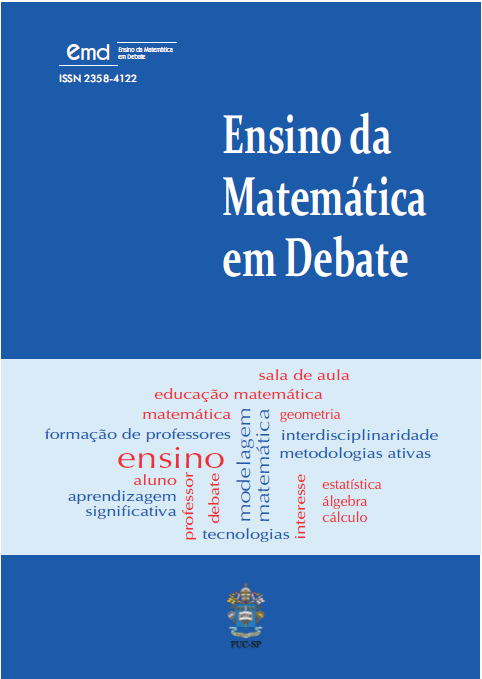Didactic study of the ambiguity specific to the syntactic structure of Landau’s “little o” notation
Keywords:
Ostensive, Non-ostensive, Syntax, Semantics, Equality, NegligibilityAbstract
Landau's "little-o" notation is a notation widely used in analysis. Its syntactic simplicity hides a semantic complexity that could confuse some students. This stems mainly from the use of the symbol of equality in the ostensive which paradoxically does not play, in this ostensive, the role of an equality in the classical sense. To this difficulty is added another, namely the interference of the common conception of negligibility on the same notion in mathematics. The analyzes that we carried out from an exchange, in an ordinary mathematics class, between students and their teacher confirm the difficulties of some students in properly handling this ostensive
References
BILETCH, B.; KAY, K; AND YU, H. An Analysis of Mathematical Notations: For Better or For Worse. Document source. Worcester Polytechnic Institute, 2015.
BLOCH, I. Concepts, objets, symboles, enseignement des mathématiques… Quelques réflexions sur l'épistémologie et la didactique. Petit x, n. 97, p. 71-79, 2015.
BOERO, P. ; DOUEK, N. La didactique des domaines d'expérience. Carrefours de l'Éducation, n. 26, v. 2, p. 99-114, 2008.
BOSCH, M. ; CHEVALLARD, Y. La sensibilité de l’activité mathématique aux ostensifs. Objet d’étude et problématique. Recherches en Didactique des Mathématiques, n. 19, v. 1, p.77-124, 1999.
BROSSARD, M. Concepts quotidiens/ concepts scientifiques : Réflexions sur une hypothèse de travail. Carrefours de l’Éducation, v.26, n. 2, p.67- 82, 2008.
CAMUS, A. La Peste. Paris: Gallimard, 1947.
CHEVALLARD, Y. Concepts fondamentaux de la didactique : Perspectives apportées par une approche anthropologique. Recherches en Didactique des Mathématiques, v. 12, n.1, p. 73-111, 1992.
CHEVALLARD, Y. Approche anthropologique du rapport au savoir et didactique des mathématiques. In: S. MAURY, S.; CAILLOT, M. (Eds.), Rapport au savoir et didactiques. Paris : Fabert, 2003, p. 81-104.
DURAND-GUERRIER, V. Which notion of implication is the right one? From logical considerations to a didactic perspective. Educational Studies in Mathematics, n. 53, v. 1, p. 5-34, 2003.
DURAND-GUERRIER, V. Négation et quantification dans la classe de mathématiques. In: DAVAL, R. ; FRATH, P.; HILGERT, E.; PALMA, S. (Eds.). Négation et référence. Reims : ÉPURE - Éditions et Presses universitaires de Reims, 2016, p. 269-288.
DUVAL, R. Quelle sémiotique de l’activité et des productions mathématiques ? Relime, Numero Especial, p. 45-81, 2006.
LABORDE, C. ; COQUIDÉ, M. ; TIBERGHIEN, A. Les situations de formation en vue de l’apprentissage du savoir scientifique et mathématique. In: TIBERGHIEN, A. (Ed.), Des connaissances naïves au savoir scientifique. Programme « École et sciences cognitives », 2002, p. 81-108.
LANDAU, E. Handbuch der Lehrer von der Verteilung der Primzahlen, American Mathematical Society, 2000.
NÉGLIGEABLE. Dictionnaire Larousse, 2022. Extrait : le 10 janvier 2022 de https://www.larousse.fr/dictionnaires/francais/n%C3%A9gligeable/54069.
Published
How to Cite
Issue
Section
License
Copyright (c) 2023 Ensino da Matemática em Debate

This work is licensed under a Creative Commons Attribution-NonCommercial 4.0 International License.

Este obra está licenciado com uma Licença Creative Commons Atribuição 4.0 Internacional.






